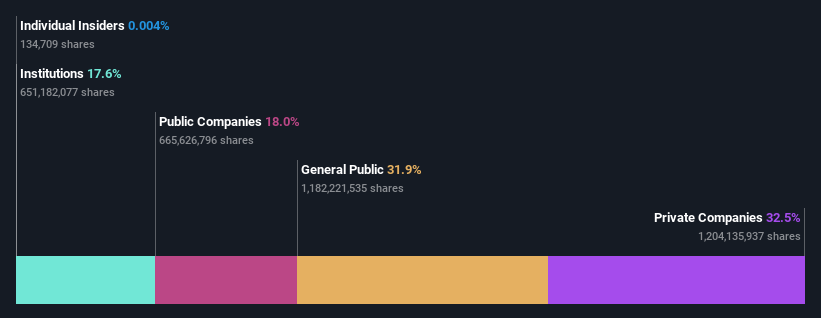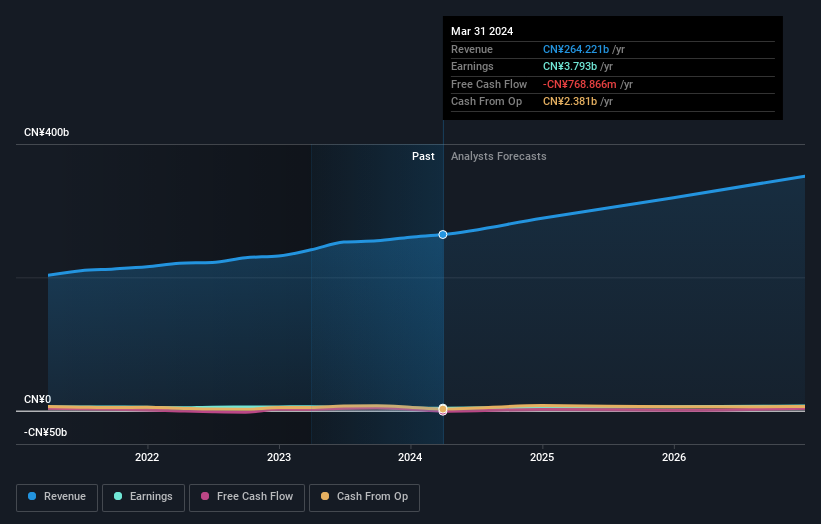- China
- /
- Healthcare Services
- /
- SHSE:601607
Shanghai Pharmaceuticals Holding Co., Ltd's (SHSE:601607) market cap surged CN¥2.3b last week, private companies who have a lot riding on the company were rewarded

Key Insights
- The considerable ownership by private companies in Shanghai Pharmaceuticals Holding indicates that they collectively have a greater say in management and business strategy
- A total of 4 investors have a majority stake in the company with 51% ownership
- Institutional ownership in Shanghai Pharmaceuticals Holding is 18%
To get a sense of who is truly in control of Shanghai Pharmaceuticals Holding Co., Ltd (SHSE:601607), it is important to understand the ownership structure of the business. With 33% stake, private companies possess the maximum shares in the company. In other words, the group stands to gain the most (or lose the most) from their investment into the company.
As a result, private companies collectively scored the highest last week as the company hit CN¥63b market cap following a 3.4% gain in the stock.
Let's delve deeper into each type of owner of Shanghai Pharmaceuticals Holding, beginning with the chart below.
Check out our latest analysis for Shanghai Pharmaceuticals Holding

What Does The Institutional Ownership Tell Us About Shanghai Pharmaceuticals Holding?
Institutional investors commonly compare their own returns to the returns of a commonly followed index. So they generally do consider buying larger companies that are included in the relevant benchmark index.
We can see that Shanghai Pharmaceuticals Holding does have institutional investors; and they hold a good portion of the company's stock. This implies the analysts working for those institutions have looked at the stock and they like it. But just like anyone else, they could be wrong. When multiple institutions own a stock, there's always a risk that they are in a 'crowded trade'. When such a trade goes wrong, multiple parties may compete to sell stock fast. This risk is higher in a company without a history of growth. You can see Shanghai Pharmaceuticals Holding's historic earnings and revenue below, but keep in mind there's always more to the story.

Shanghai Pharmaceuticals Holding is not owned by hedge funds. The company's largest shareholder is SIIC Shanghai (Holdings) Corporation Limited, with ownership of 19%. In comparison, the second and third largest shareholders hold about 18% and 12% of the stock.
On looking further, we found that 51% of the shares are owned by the top 4 shareholders. In other words, these shareholders have a meaningful say in the decisions of the company.
While studying institutional ownership for a company can add value to your research, it is also a good practice to research analyst recommendations to get a deeper understand of a stock's expected performance. There are plenty of analysts covering the stock, so it might be worth seeing what they are forecasting, too.
Insider Ownership Of Shanghai Pharmaceuticals Holding
The definition of an insider can differ slightly between different countries, but members of the board of directors always count. Management ultimately answers to the board. However, it is not uncommon for managers to be executive board members, especially if they are a founder or the CEO.
Insider ownership is positive when it signals leadership are thinking like the true owners of the company. However, high insider ownership can also give immense power to a small group within the company. This can be negative in some circumstances.
Our most recent data indicates that insiders own less than 1% of Shanghai Pharmaceuticals Holding Co., Ltd. But they may have an indirect interest through a corporate structure that we haven't picked up on. As it is a large company, we'd only expect insiders to own a small percentage of it. But it's worth noting that they own CN¥2.3m worth of shares. It is good to see board members owning shares, but it might be worth checking if those insiders have been buying.
General Public Ownership
The general public, who are usually individual investors, hold a 32% stake in Shanghai Pharmaceuticals Holding. While this size of ownership may not be enough to sway a policy decision in their favour, they can still make a collective impact on company policies.
Private Company Ownership
Our data indicates that Private Companies hold 33%, of the company's shares. Private companies may be related parties. Sometimes insiders have an interest in a public company through a holding in a private company, rather than in their own capacity as an individual. While it's hard to draw any broad stroke conclusions, it is worth noting as an area for further research.
Public Company Ownership
It appears to us that public companies own 18% of Shanghai Pharmaceuticals Holding. We can't be certain but it is quite possible this is a strategic stake. The businesses may be similar, or work together.
Next Steps:
While it is well worth considering the different groups that own a company, there are other factors that are even more important. For example, we've discovered 2 warning signs for Shanghai Pharmaceuticals Holding that you should be aware of before investing here.
If you are like me, you may want to think about whether this company will grow or shrink. Luckily, you can check this free report showing analyst forecasts for its future.
NB: Figures in this article are calculated using data from the last twelve months, which refer to the 12-month period ending on the last date of the month the financial statement is dated. This may not be consistent with full year annual report figures.
New: Manage All Your Stock Portfolios in One Place
We've created the ultimate portfolio companion for stock investors, and it's free.
• Connect an unlimited number of Portfolios and see your total in one currency
• Be alerted to new Warning Signs or Risks via email or mobile
• Track the Fair Value of your stocks
Have feedback on this article? Concerned about the content? Get in touch with us directly. Alternatively, email editorial-team (at) simplywallst.com.
This article by Simply Wall St is general in nature. We provide commentary based on historical data and analyst forecasts only using an unbiased methodology and our articles are not intended to be financial advice. It does not constitute a recommendation to buy or sell any stock, and does not take account of your objectives, or your financial situation. We aim to bring you long-term focused analysis driven by fundamental data. Note that our analysis may not factor in the latest price-sensitive company announcements or qualitative material. Simply Wall St has no position in any stocks mentioned.
About SHSE:601607
Shanghai Pharmaceuticals Holding
Shanghai Pharmaceuticals Holding Co., Ltd.
Excellent balance sheet and good value.

